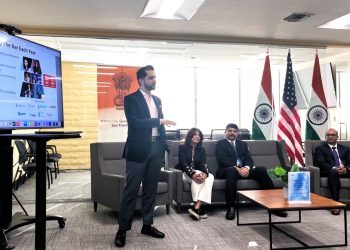The U.S. agency tasked with driving scientific research has launched a program to connect American startups with Taiwanese peers, backing the island’s ambitions to foster key players in strategic sectors like semiconductors, AI and beyond.
The National Science Foundation—one of the federal government’s biggest outfits for funding research—is for the first time sponsoring a series of workshops abroad to help U.S. startups work with their overseas counterparts. It chose to kick things off in Taiwan, which plays an increasingly pivotal role in chips and the technology supply chain. Its Ministry of Economic Affairs is backing the effort, which aims to discover and finance firms exploring “deep tech,” or cutting-edge arenas including biotechnology and quantum computing.
The U.S. agency intends to expand the program to U.S.-allied nations over time, NSF director Sethuraman Panchanathan told Bloomberg News. While many of history’s most successful startups—including the likes of Nvidia Corp.—were born in the U.S., the bulk of hardware innovation now centers on Asia. Taiwan Semiconductor Manufacturing Co. alone makes about 90% of the most advanced logic chips. The U.S. Commerce Department has awarded TSMC $11.6 billion of grants and loans to build three plants in Arizona, underscoring its pivotal industry role.
“You just can’t do everything on your own or within the United States. You have supply chains and other things that are global,” said Michelle…





















































![[Updated] Contract Management Software Market Size Analysis | Aaveneir (USA), Agiloft (USA), Apptus (USA)](https://newzznow.com/wp-content/uploads/2024/04/research-reports-75x75.jpg)



